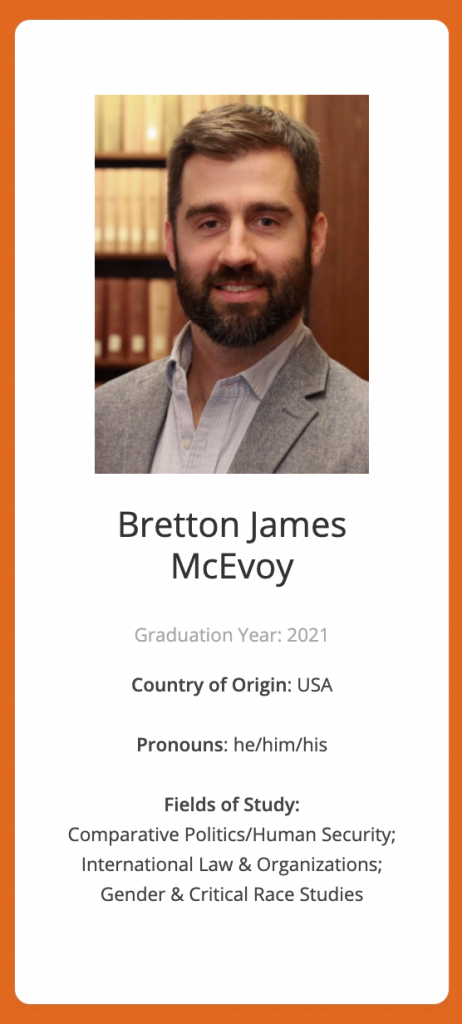PhD Students and Alumni
Current Students
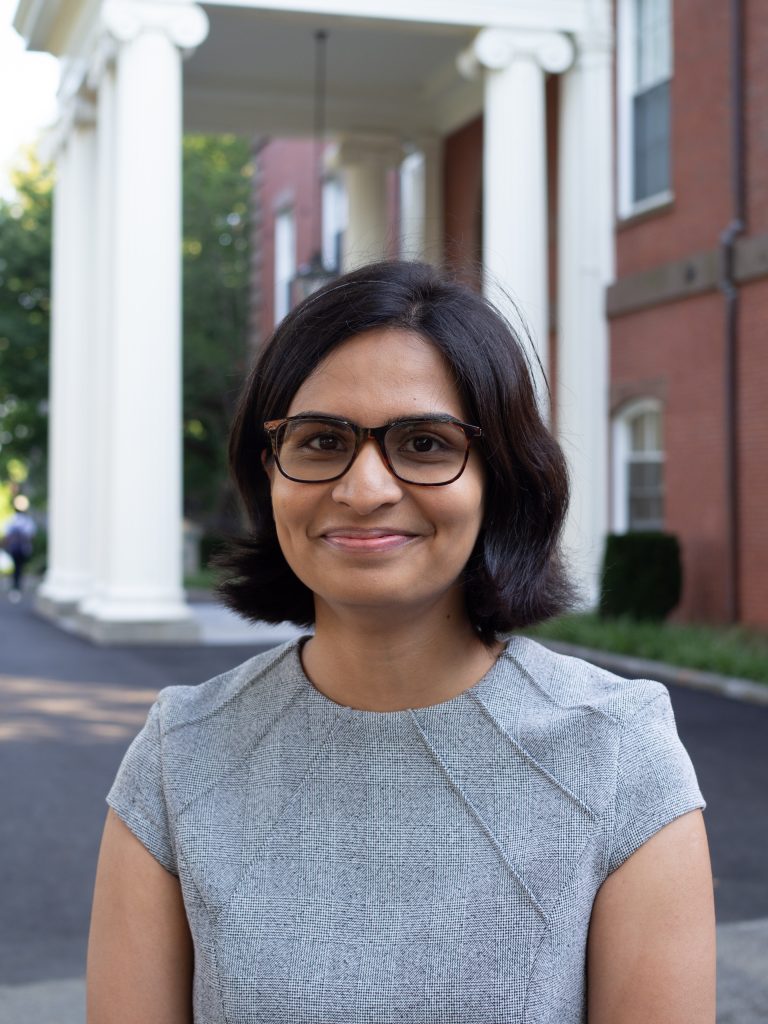
Dipali Anumol
PhD Candidate, 2023
Country of Origin: India
Pronouns: she/her/hers
Fields of Study:
Gender Analysis in International Studies; Human Security
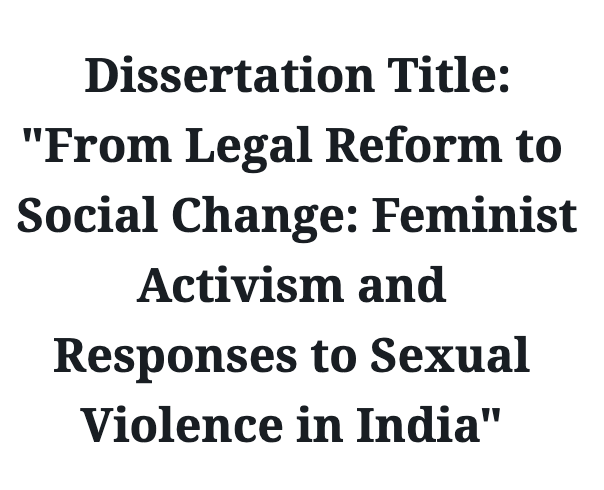
Chairs: Professor Kimberly Theidon, Professor Tom Dannenbaum
Education:
Integrated MA, Development Studies, Indian Institute of Technology, Madras
MSc, International Relations (Research), The London School of Economics and Political Science
Personal Website:
https://fieldnotesfromafeministresearcher.wordpress.com
Biography
Dipali Anumol is a PhD Candidate at the Fletcher School of Law and Diplomacy at Tufts University where she specializes in Gender and Human Security. Her research interests include South Asia, gender, feminist activism, legal reform for social change, and sexual and gender-based violence (SGBV). Her proposed doctoral work aims to understand the relationship between feminist advocacy, civil society, and responses to sexual violence. Prior to Fletcher, she worked in development consulting across a range of projects on education, child rights, gender, and urban development. Dipali previously studied International Relations at the London School of Economics and Political Science (LSE) and Development Studies at the Indian Institute of Technology, Madras (IIT-M).
Recent Publications
Building an Ethics of Care in Research During COVID-19. For King’s College London’s Feminist Perspectives series. January, 2021.
Rwanda’s Children of Bad Memory. With Samuel Munderere. In Challenging Conceptions: Children Born of Wartime Rape and Sexual Exploitation, Kimberly Theidon and Dyan Mazurana (eds.), forthcoming.
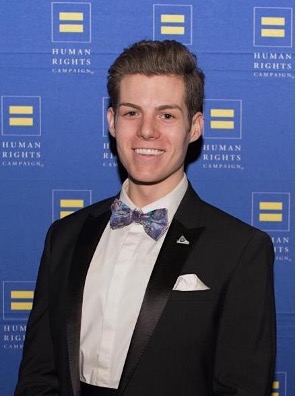
Nicholas Helldorfer Cicchinelli
PhD Student
Country of Origin: USA
Pronouns: he/him/his
Fields of Study:
Gender and Intersectional Analysis; Public International Law
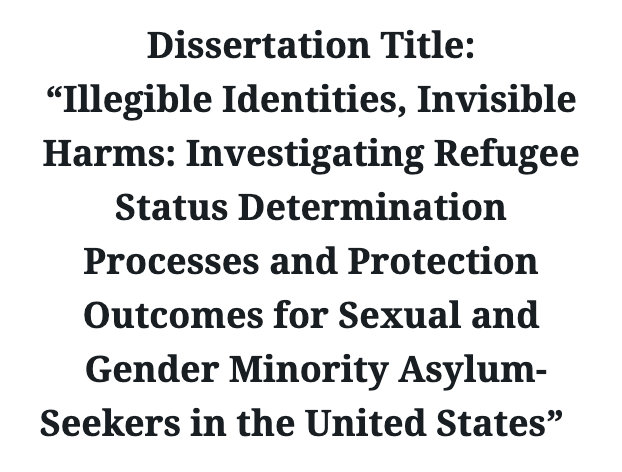
Chair: Professor Kimberly Theidon
Education:
BA, International Relations and Russian Studies, Wheaton College (Massachusetts)
MALD, The Fletcher School, Tufts University
Biography
My research aims to shed light on the experiences of sexual and gender minorities resisting discrimination and political repression, surviving violence and persecution, and seeking international protection through refuge or asylum. I am particularly interested in the interpretation and implementation of international human rights law and U.S. foreign policy as applied to sexual orientation and gender identity (SOGI).
At Fletcher, I have served as the fundraising chair for the 2019 Conference on Gender and International Affairs, a co-leader of Pride at Fletcher, and a member of the Student Council and the Standing Committee on Diversity, Equity, and Inclusion. I interned with the U.S. embassy in Riga, Latvia in the summer of 2019 and will be a Diverse Democracy Fellow with CIRCLE at the Tisch College of Civic Life in the summer of 2021.
Prior to Fletcher, I supported democracy and human rights programs in Russia and Eurasia at the National Endowment for Democracy in Washington, DC and was a Fulbright English Teaching Assistant to Moldova.
Recent Publications
“Queering COVID-19” in Intersectionality and COVID-19. Fletcher LEADS. April 15, 2020.
“Pride 2020: Connecting Queer Theory and International Relations.” The Fletcher School. June 26, 2020.
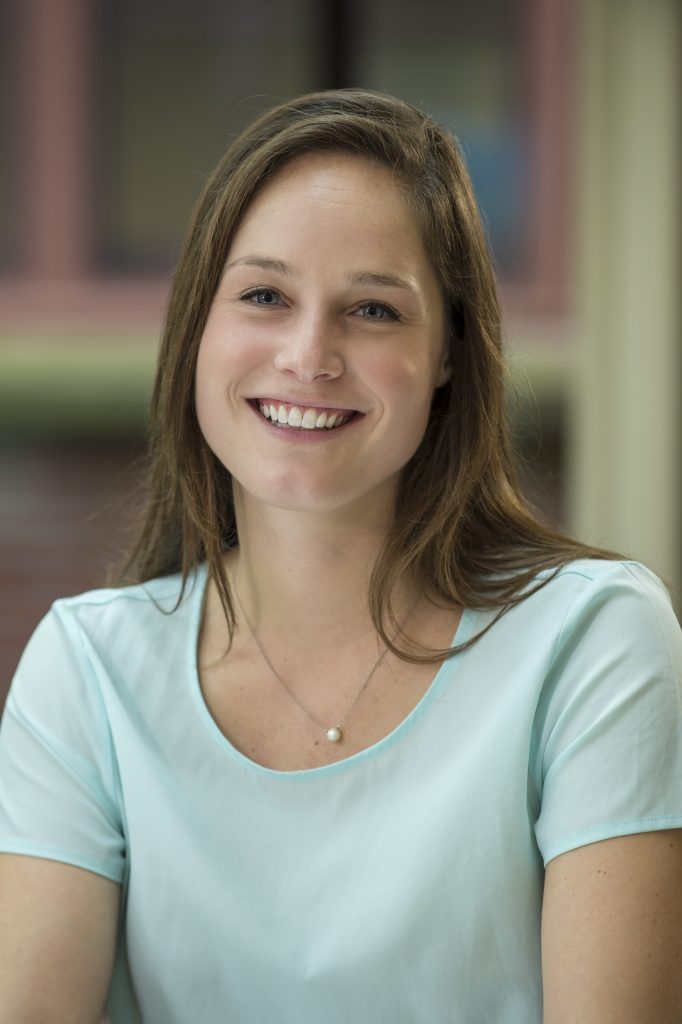
Alex McAuliff
PhD Candidate, 2022
Country of Origin: USA
Pronouns: she/her/hers
Fields of Study:
Gender and Intersectional Analysis; International Negotiation and Conflict Resolution
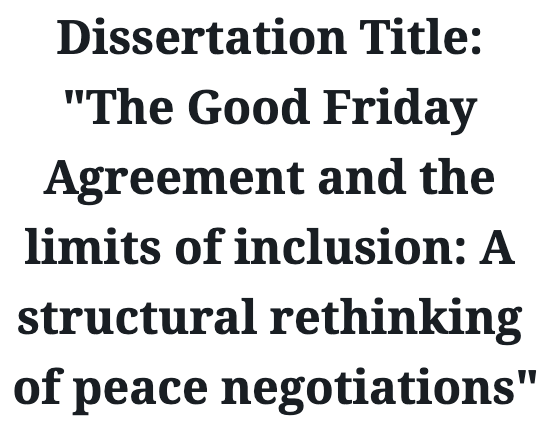
Chair: Professor Kimberly Theidon
Committee: Professor Eileen Babbitt, Professor John-Paul Lederach
Education:
BA, Global Studies, Government, Colby College
MALD, The Fletcher School, Tufts University
Biography
Alex McAuliff is a doctoral student at the Fletcher School of Law and Diplomacy at Tufts University, where her work focuses on gender, negotiations, and peacebuilding. She is particularly interested in the limits of women’s inclusion in negotiations absent attention to the power hierarchies that inform these processes. In her dissertation work, she questions the foundational assumptions of negotiations, with specific attention to the ways militarized power shapes the people and issues deemed conflict-related. To do so, she examines the process and legacy of the Good Friday Agreement in Northern Ireland and the ways gendered, racialized, and classed violence and insecurity continue to be experienced by those at the margins, despite twenty years of a political peace. Prior to pursuing her doctoral degree, Alex worked as a dialogue facilitator with a small peacebuilding group in Northern Ireland, as well as at Seeds of Peace, a youth-focused leadership organization. While pursuing her master’s degree, she worked with the Kroc Institute for Peace and Justice’s Women PeaceMakers Program. Alex holds a Master of Law and Diplomacy from the Fletcher School, and a Bachelor of Arts from Colby College.
Recent Presentations
April 8, 2021. “The Good Friday Agreement and the limits of inclusion: A structural rethinking of peace negotiations,” International Studies Association, Virtual.
February 18, 2021. Presented with Dipali Anumol and Kinsey Spears. “Research from my parents’ basement: Junior scholars on COVID-19’s implications for Feminist Methods,” International Feminist Journal of Politics.
November 12, 2020. “Lessons from non-violent resistance: What peace negotiations can learn.” Carr Center for Human Rights, Harvard Kennedy School, Cambridge, Massachusetts.
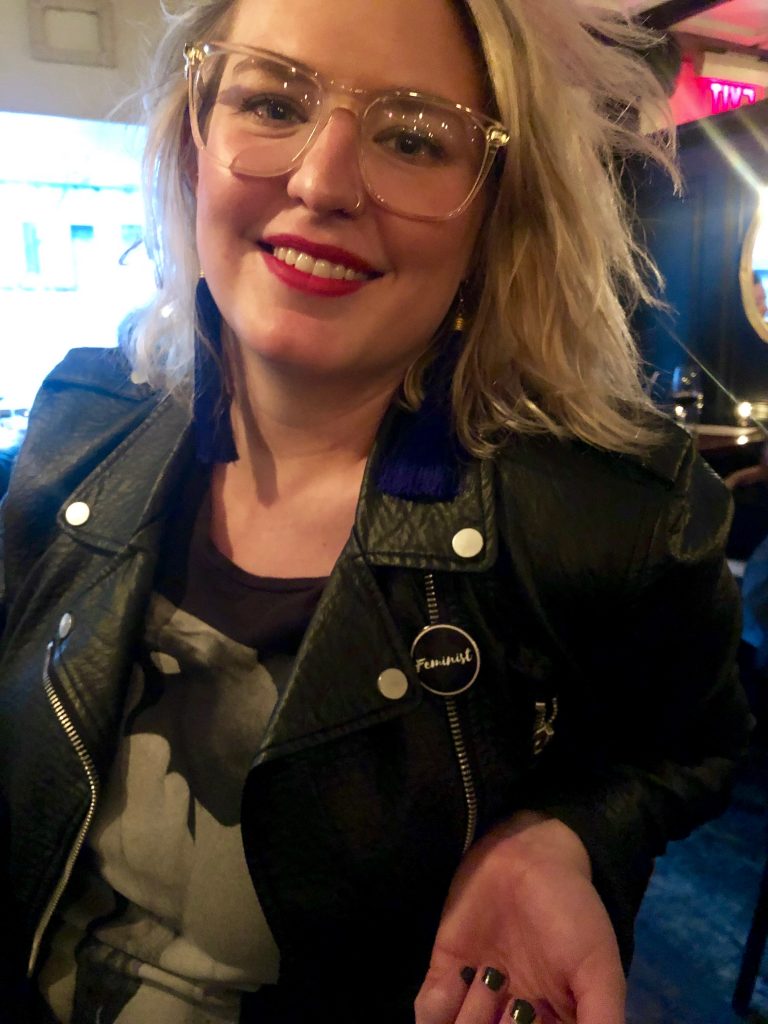
Kinsey Spears
PhD Candidate, 2022
Country of Origin: USA
Pronouns: she/her/hers
Fields of Study:
Gender Analysis in International Studies; International Security Studies
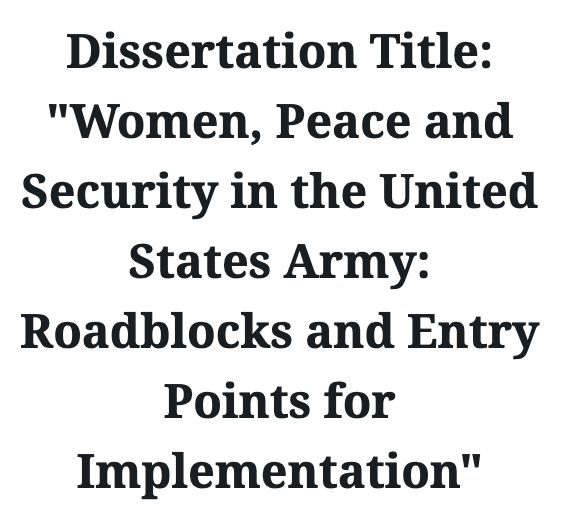
Chair: Professor Dyan Mazurana
Education:
BA, International Affairs, Arabic, University of Georgia
MALD, The Fletcher School, Tufts University
Personal Website:
https://www.linkedin.com/in/kinsey-spears
Biography
Prior to coming to Fletcher I served as a Peace Corps volunteer in Banteay Meanchey, Cambodia. While in Cambodia I taught English and pedagogy to teenagers and young adults at a local high school and a teacher training college. I also taught additional courses in my town around how to apply for international academic programs and scholarships, art classes and health education. After my Peace Corps service, I worked for Senator Kirsten Gillibrand as her Director of Scheduling. Senator Gillibrand’s commitment to feminist issues and developing women’s leadership both in and out of politics and working with youth in Cambodia heavily impacted my academic pursuits around feminist scholarship and gender studies.
My doctoral work is building off of the work I did in my master’s thesis which looked at the intersection of child protection and security sector partnerships in Afghanistan. I studied the historical evolution of bacha bazi and the United States’ response to instances of bacha bazi by our security partners in the Afghan National Security Forces. Ultimately, I hope to expand on this work and assess how the United States addresses gross human rights violations by critical security partners in Afghanistan.
Recent Publications:
“Why U.S.-China Relations Need A Gender Analysis.” Terrain Analysis, The Newsline Institute. March 3, 2022.
“Gender, Famine, and the Female Mortality Advantage.” Occasional Paper #36, World Peace Foundation and Feinstein International Center. December 2021.
“What About the Boys: A Gendered Analysis of the U.S. Withdrawal and Bacha Bazi in Afghanistan.” Terrain Analysis, The Newsline Institute. June 24, 2021.
“Child marriage in armed conflict.” IRRC No. 911. International Committee of the Red Cross. August 2019.
Alumni
Dissertation Title and Committee:
“Wedded to Warfare: Forced Marriage in Rebel Groups”
Dyan Mazurana (The Fletcher School), Richard Shultz (The Fletcher School), Dara Kay Cohen (Harvard Kennedy School)
Bio
Phoebe Donnelly is a Research Fellow and the Head of the Women, Peace and Security (WPS) Program at the International Peace Institute. Phoebe is also a Women and Public Policy Research Fellow at Harvard Kennedy School and a Visiting Fellow at Feinstein International Center.
Dr. Donnelly received her PhD in International Relations from The Fletcher School of Law and Diplomacy at Tufts University. Her dissertation Wedded to Warfare: Forced Marriage in Rebel Groups won the Peter Ackerman Award for the outstanding doctoral dissertation at The Fletcher School in 2019. Phoebe’s research has been featured in several media outlets including BBC Radio, CNN, The Guardian, and The Huffington Post. Her writing has also been published by Global Society and Small Wars and Insurgencies.
How have you utilized your Gender PhD post-Fletcher?
I just graduated, but my research, teaching and activist commitments each engage personally and structurally with the constructs of gender and race, with a particular focus on (my) intersectional white masculinities
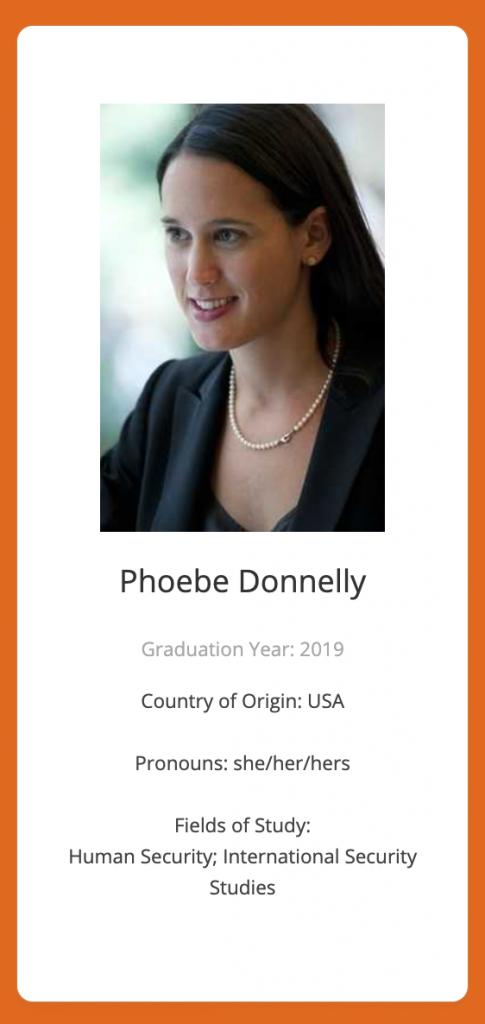
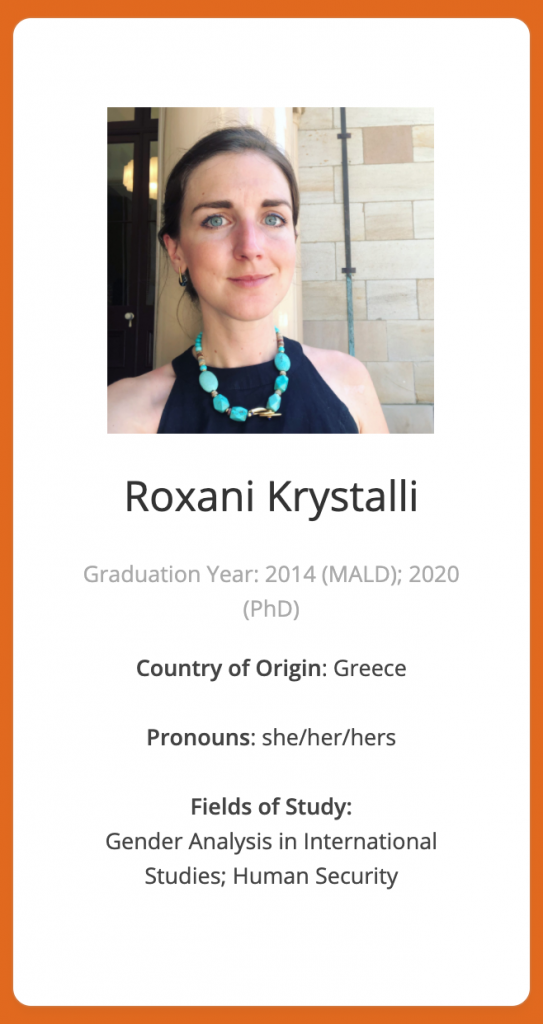
Dissertation Title and Committeee:
“We are not good victims”: Hierarchies of suffering and the politics of victimhood in Colombia
Kimberly Theidon (Chair), Alex de Waal, Dyan Mazurana
Bio
Dr. Roxani Krystalli is a Lecturer (Assistant Professor) at the University of St Andrews. Her research and teaching explore various dimensions of feminist peace and conflict studies, as well as the politics of nature and place. She is particularly interested in questions of narrative and storytelling in international politics. Her writing has appeared in the International Feminist Journal of Politics, the European Journal of International Relations, the Oxford Handbook on Gender and Violence, the Companion to Peace and Conflict Fieldwork, among others, as well as in several media outlets and blogs. Her research on the politics and hierarchies of victimhood in Colombia was awarded Peter Ackerman prize for best PhD dissertation in 2020, and her blog, Stories of Conflict and Love, won the Best Individual Blog award at the International Studies Association in 2019. Roxani has spent a decade working as a practitioner in the humanitarian field, focusing on the intersection of gender, justice, and violence, and she regularly advises international organizations on these issues. Born and raised in Thessaloniki, Greece, she now lives in Dunblane, Scotland.
How have you utilized your Gender PhD post-Fletcher?
After Fletcher, I joined the faculty of the University of St Andrews. This has been a supportive and engaging site of feminist thinking and pedagogy for me. I have had a lot of freedom to design my own classes, and am particularly excited about my undergraduate modules on Feminist Theories in Global Politics and on the Politics of Nature and Place. The feminist curiosity and creativity students bring to the classroom has been a real source of inspiration and hope for me. I am also excited to have developed one of our core Masters level classes on Critical Approaches to Peacebuilding. The seeds of the feminist, decolonial, and critical theoretical lenses that define my research and teaching were sown at Fletcher, and I am grateful to watch them grow.
Personal Website: http://www.roxanikrystalli.com
Dissertation Title and Committee:
White Reckonings: Transformative justice & anti-racist white activists in the United States
Dyan Mazurana (Chair), M. Brinton Lykes, Bridget Conley, Karla Nicholson, Gary Barker
Bio
I am currently (May 2021) a Postdoctoral Fellow and Lecturer at the Willy Brandt School of Public Policy at the University of Erfurt in Germany, where my research and writing focuses on dominant racial and gender groups, how they (we) perpetuate systemic oppression, and why and how some group members seek to challenge the systems that preserve their dominance. I received my PhD from the Fletcher School in February 2021, where my dissertation on “White Reckonings” accompanied anti-racist white activists and male-identified feminists as they endeavored to contribute to transformative justice possibilities in the United States. My current research looks comparatively and globally at issues of colonial-racial reckoning and repair, with a particular focus on Germany and the United States. Prior to my graduate studies, I also worked in global humanitarian assistance and human rights, having managed humanitarian programs in a number of disaster, conflict and post-crisis environments. Raised in the United States, I currently live in Germany with my German partner and binational daughter.
How have you utilized your Gender PhD post-Fletcher?
I just graduated, but my research, teaching and activist commitments each engage personally and structurally with the constructs of gender and race, with a particular focus on (my) intersectional white masculinities
